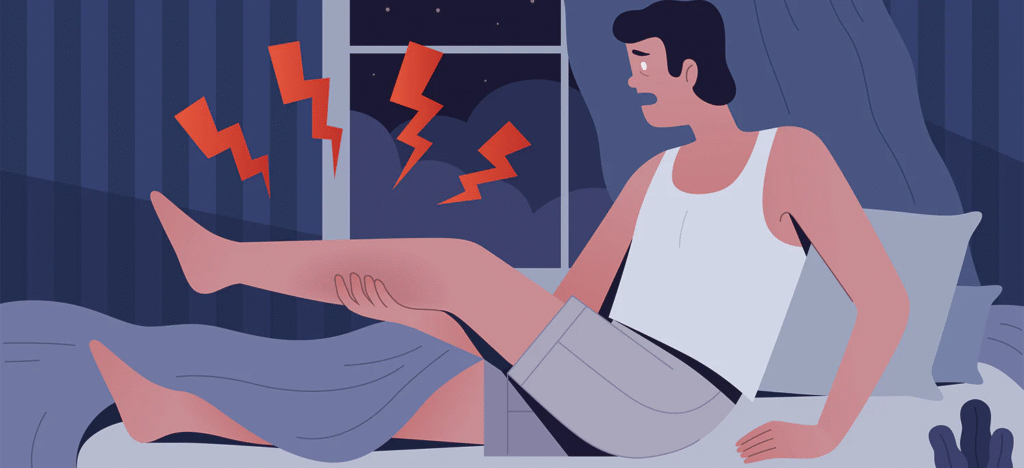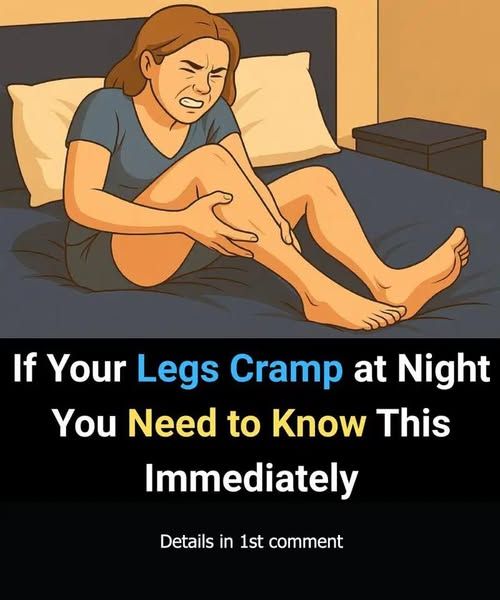There’s nothing quite as disruptive as being pulled from a peaceful sleep by a sudden, sharp cramp in your leg. You bolt upright, trying to stretch or rub the muscle, but the pain feels like it has a mind of its own. If this sounds familiar, you’re not alone.
Nighttime leg cramps — also called nocturnal leg cramps — affect millions of adults, particularly as we age. Though usually harmless, these involuntary muscle contractions can be incredibly painful and may occur regularly enough to interfere with your sleep and overall quality of life.
Let’s explore what causes these cramps, how to prevent them, and when it’s time to speak to a doctor.
What Are Nighttime Leg Cramps?
Nighttime leg cramps are sudden, involuntary contractions or spasms of the muscles — usually in the calf, but sometimes in the foot or thigh — that occur while you’re at rest or sleeping. These cramps can last anywhere from a few seconds to several minutes, and the soreness or tenderness may linger even after the cramp passes.
Common symptoms include:
- A sharp, tightening pain in the leg
- Visible muscle hardening or twitching
- Discomfort that may wake you from sleep or make it difficult to fall back asleep
What Causes Leg Cramps at Night?
There isn’t always a clear reason behind these cramps, but several common factors and conditions are known to contribute:
1. Age
Muscle loss and changes in nerve function that occur naturally with aging can make leg cramps more frequent after age 50 or 60.
2. Dehydration
When your body lacks fluids — especially after sweating or not drinking enough water — your muscles are more prone to cramping.
3. Electrolyte Imbalance
Low levels of minerals like magnesium, potassium, calcium, or sodium can disrupt normal muscle function and lead to cramping.
4. Poor Circulation
Reduced blood flow to the legs, especially while lying down, may cause the muscles to spasm during the night.
5. Overexertion
Overusing or straining your leg muscles during the day — especially through walking, standing for long periods, or vigorous exercise — can trigger nighttime cramps.
6. Pregnancy
Many pregnant women experience leg cramps, especially in the second and third trimesters, due to fluid shifts and increased pressure on blood vessels.
7. Medical Conditions
Certain health problems can increase cramping risk, including:
- Diabetes
- Kidney disease
- Thyroid issues
- Nerve disorders
8. Medications
Some medications list leg cramps as a side effect, such as:
- Diuretics (used for high blood pressure or heart conditions)
- Statins (used to lower cholesterol)
- Beta-blockers
- Certain asthma medications
How to Prevent Nighttime Leg Cramps

While not all leg cramps can be avoided, small changes to your routine may reduce how often they occur:
1. Stay Hydrated
Drink water throughout the day to keep your muscles properly hydrated. Dehydration is one of the simplest and most common causes of cramps.
2. Stretch Before Bed
Gentle leg stretches at bedtime — especially for the calves and hamstrings — can help relax your muscles before sleep.
3. Maintain Electrolyte Balance
Eat a well-rounded diet with plenty of magnesium, potassium, and calcium. Good sources include:
- Bananas
- Leafy greens
- Nuts and seeds
- Beans
- Dairy products
4. Limit Alcohol and Caffeine
Both substances can contribute to dehydration and muscle irritation if consumed in excess.
